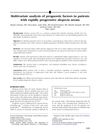TLDR People who get alopecia areata after age 50 usually have mild symptoms, high chances of hair regrowth, and often have other health conditions.
The retrospective cohort study from 2009 to 2015 included 29 patients with late-onset alopecia areata (AA), defined as onset at age 50 or above, out of 288 patients with AA. The study found a significant female predominance (86.2%), with a female-to-male ratio of 6.2:1. A family history of AA was present in 17.2% of participants, thyroid disease in 31%, and atopic background in 6.9%. Stressful events were reported by 58.6% of participants. The disease was generally mild and patchy, with 82.8% of participants experiencing complete hair regrowth and 37.9% experiencing relapse. The study concluded that late-onset AA is characterized by less extensive disease, high remission rates, and frequent relapses, with 79.3% of participants having at least one co-existing systemic disease and 10.3% reporting a malignancy. Treatments were mainly topical, and initial hair regrowth was typically seen within 3 months. The study's limitations include its retrospective design, small sample size, and limited follow-up, highlighting the need for further research.
4 citations
,
January 2015 in “Indian Journal of Dermatology” 15.33% of young Caucasian men have severe hair loss, with higher rates in Jewish men and links to age, BMI, and possibly metabolic syndrome.
9 citations
,
January 2015 in “Annals of dermatology/Annals of Dermatology” Alopecia areata in elderly people is usually mild and responds well to treatment.
110 citations
,
December 2013 in “The journal of investigative dermatology. Symposium proceedings/The Journal of investigative dermatology symposium proceedings” Alopecia areata is a genetic and immune-related hair loss condition that is often associated with other autoimmune diseases and does not typically cause permanent damage to hair follicles.
 26 citations
,
September 2012 in “Journal of The American Academy of Dermatology”
26 citations
,
September 2012 in “Journal of The American Academy of Dermatology” Patients with rapidly progressive alopecia areata often have a better outlook and shorter disease duration, with regrown fine hairs and no past alopecia being positive signs.
 21 citations
,
February 2012 in “Journal of the European Academy of Dermatology and Venereology”
21 citations
,
February 2012 in “Journal of the European Academy of Dermatology and Venereology” Late-onset alopecia areata in Taiwanese patients is more common in women, usually starts at age 57, often involves less than 10% hair loss, and may have a minimal link to thyroid issues.
 51 citations
,
January 2012 in “Annals of Dermatology”
51 citations
,
January 2012 in “Annals of Dermatology” Asian hair loss differs from Europeans; consider individual needs and psychological well-being for treatment.
 391 citations
,
January 2010 in “Journal of The American Academy of Dermatology”
391 citations
,
January 2010 in “Journal of The American Academy of Dermatology” Half of people with Alopecia Areata may see hair regrowth within a year without treatment, but recovery is unpredictable.
286 citations
,
August 2007 in “Journal of Clinical Investigation” Alopecia areata is an autoimmune disease where T cells attack hair follicles.
 148 citations
,
December 2018 in “Journal of autoimmunity”
148 citations
,
December 2018 in “Journal of autoimmunity” Alopecia areata is an autoimmune disease causing patchy hair loss, often with other autoimmune disorders, but its exact causes are unknown.
 4 citations
,
November 2018 in “JAAD case reports”
4 citations
,
November 2018 in “JAAD case reports” Alopecia areata can sometimes appear as a straight line of hair loss instead of round patches.
May 2018 in “Journal of cosmetology & trichology” Combining platelet-rich plasma therapy with prostaglandin-F eye drops can significantly regrow hair in alopecia universalis.







